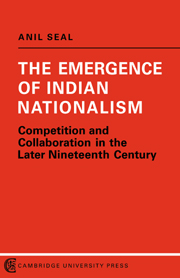Book contents
- Frontmatter
- Contents
- List of Maps and Tables
- Preface
- Abbreviations
- India: British Provinces and Native States
- 1 Political India
- 2 The Political Arithmetic of the Presidencies
- 3 The Rewards of Education
- 4 The Policies of the Rulers
- 5 The Politics of the Associations
- 6 The Politics of Union
- 7 The Muslim Breakaway
- 8 Perspectives
- Appendices
- Glossary
- Biographical Notes
- Bibliography
- Index
- Frontmatter
- Contents
- List of Maps and Tables
- Preface
- Abbreviations
- India: British Provinces and Native States
- 1 Political India
- 2 The Political Arithmetic of the Presidencies
- 3 The Rewards of Education
- 4 The Policies of the Rulers
- 5 The Politics of the Associations
- 6 The Politics of Union
- 7 The Muslim Breakaway
- 8 Perspectives
- Appendices
- Glossary
- Biographical Notes
- Bibliography
- Index
Summary
British rule in India became the most spectacular case of imperialism in modern times, but it was a special case as well. The early conquests seemed glittering to the men who made them, but half a century later the mid-Victorians, who relied on influence and looked askance on rule, were clear that they wanted no more Indias out of the bargain basements of Asia. Their Indian empire was not a millstone but neither had it turned out to be a treasure-trove. Only gradually was India made into a credible economic asset to the British economy as a whole rather than to a favoured few. Nevertheless the narrow interests originally confined to traders, shipping men and dabblers in stock broadened out to embrace cotton masters and railway builders. Railways also attracted the investor, and the flow of private capital increased with the growth of such cash crops as tea, indigo and jute. By the last quarter of the nineteenth century, the patterns of Indian trade were fitting conveniently into the international needs of the British economy.
Yet many of these new advantages might have been drawn from an India controlled informally, without the administrative loads, the diplomatic liabilities and the foreign wars to which Britain was committed by her oriental empire. On the logic of Cobdenism it was hard to justify so gigantic a possession in terms of the links between Britain and India alone. The advantages showed to the full only when they were placed in the larger context of British interests in Asia as a whole.
- Type
- Chapter
- Information
- The Emergence of Indian NationalismCompetition and Collaboration in the Later Nineteenth Century, pp. 1 - 24Publisher: Cambridge University PressPrint publication year: 1968



